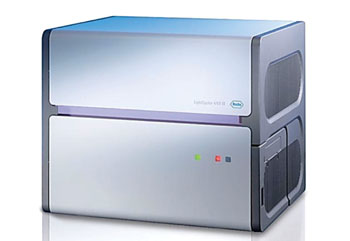Ovarian Cancer-Specific Markers Leads to Early Diagnosis
By LabMedica International staff writers
Posted on 09 Jun 2015
While DNA carries all the instructions necessary for life, its actual sequence contains much more than just the genes that code for proteins, while in contrast messenger ribonucleic acids (mRNAs) are complementary copies of just the genes.Posted on 09 Jun 2015
Ovarian cancer is notoriously difficult to diagnose and treat, making it an especially fatal disease but a custom bioinformatics algorithm has identified human mRNAs that distinguish ovarian cancer cells from normal cells and provide new therapeutic targets.

Image: The LightCycler 480 II rapid high-throughput, plate-based real-time polymerase chain reaction (PCR) amplification and detection instrument (Photo courtesy of Roche).
Scientists at the University of California, San Diego (La Jolla, CA, USA) developed custom bioinformatics algorithms to analyze transcriptome sequence data of 296 ovarian cancer and 1,839 normal tissues and validated putative tumor-specific mRNA isoforms using two large public databases of genetic information.
The teams identified six mRNA isoform molecules that have the tumor specificity required for an early detection diagnostic of ovarian cancer. They also validated their digital results in the real world using real time- quantitative polymerase chain reaction (RT-qPCR), a gene amplifying technique, to detect the same ovarian cancer-specific mRNA molecules in laboratory grown cells using the LightCycler 480 instrument (Roche Diagnostics Corporation; Indianapolis, IN, USA).
Beyond their diagnostic potential, some of the mRNA isoforms identified in the study could also act as new therapeutic targets. These mRNA isoforms are predicted to encode proteins with unique amino acid sequences, which might allow them to be specifically targeted with certain therapeutics, such as monoclonal antibodies or T-cell-based vaccines. The ovarian cancer-specific mRNA isoforms themselves could also be targeted with new therapeutic drugs.
The authors concluded that their results revealed multiple candidate diagnostic and therapeutic targets with unique sequences that were expressed in most of the cancers examined but not in normal tissues. The process they developed can be readily applied to identify diagnostic and therapeutic targets for any of the 30 or more tumor types for which large amounts of transcriptome data now exist.
Cheryl Saenz, MD, a clinical professor of reproductive medicine and study coauthor, said, “Our findings were made in a laboratory and were performed on ovarian cancer cells from cell lines. Clinical trials will need to be conducted on women to confirm the presence of these markers in women that we know have cancer, as well as to document the absence of the markers in women that do not have ovarian cancer.” The study was published on May 26, 2015, in the journal Proceedings of the National Academy of Sciences of the United States of America (PNAS).
Related Links:
University of California, San Diego
Roche Diagnostics Corporation














